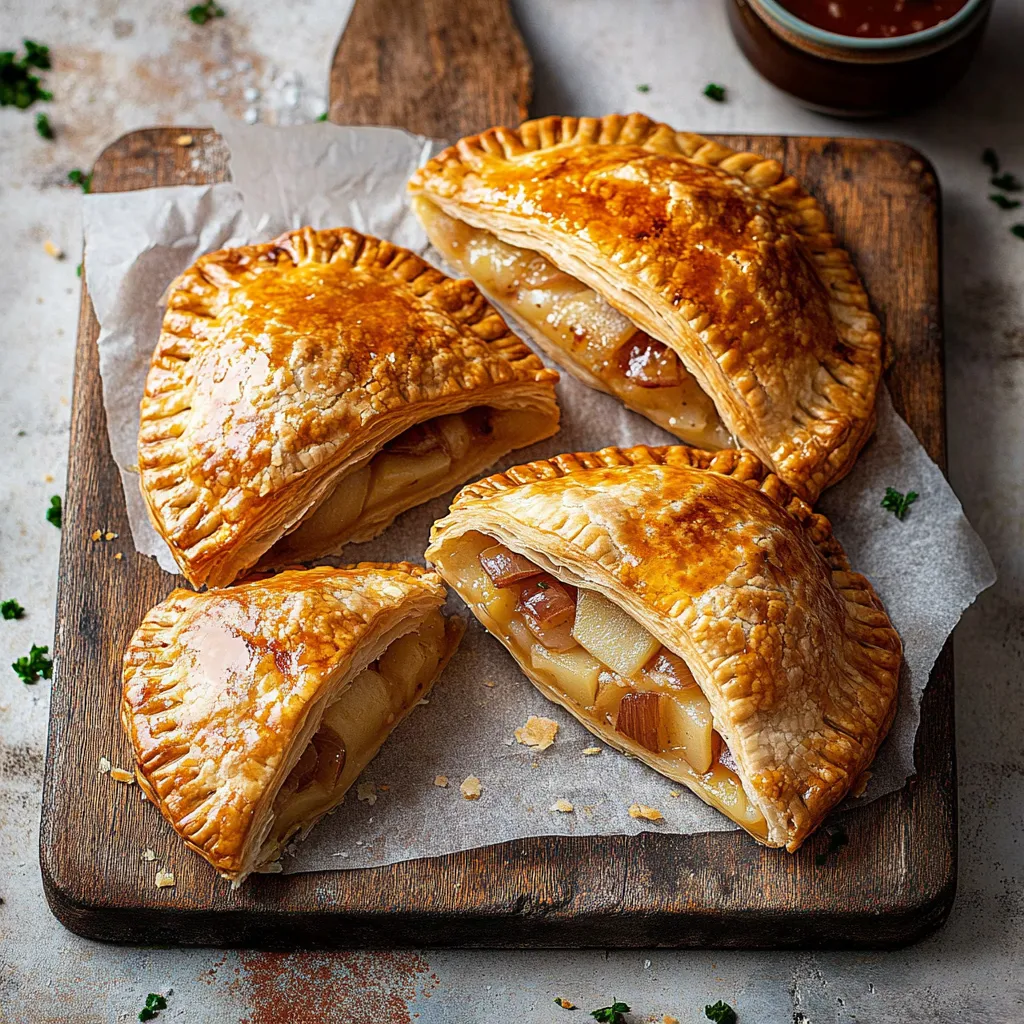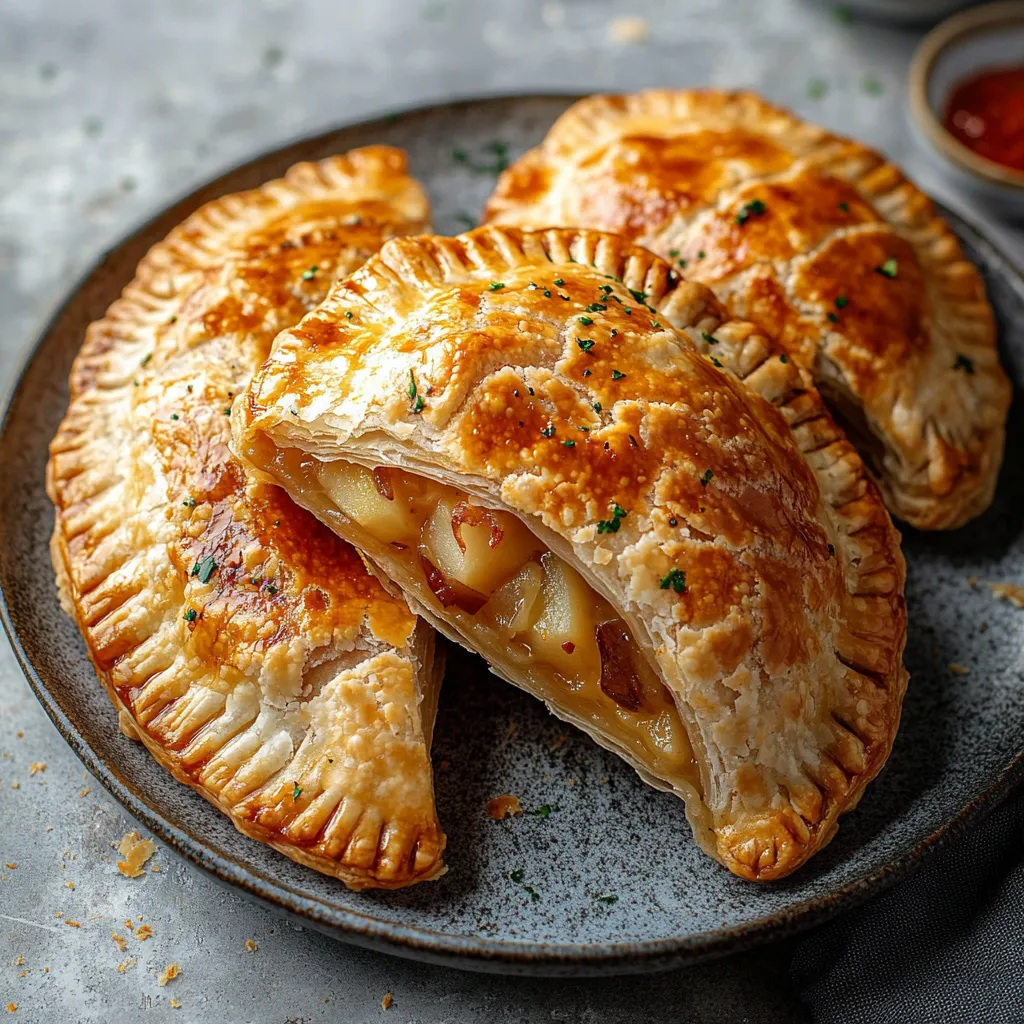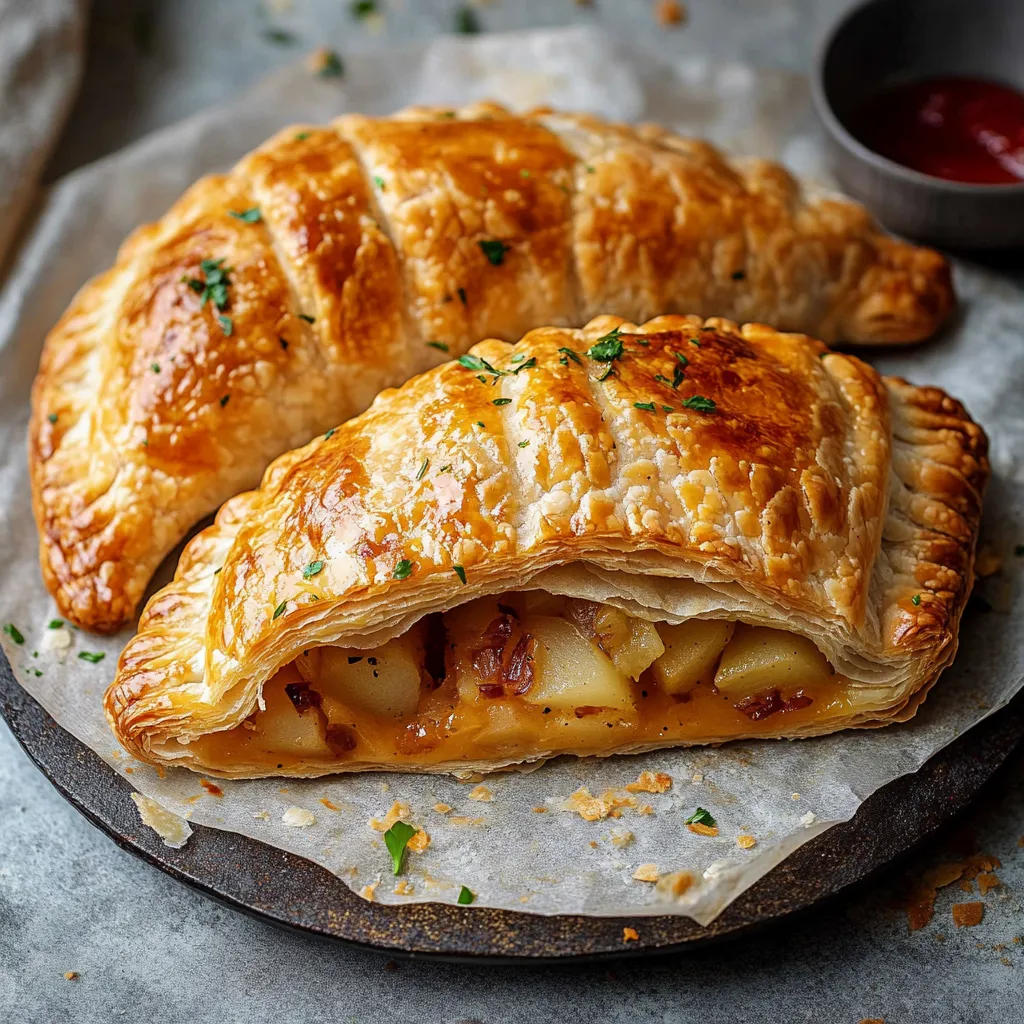 Pin
Pin
Cheese and onion pasties with potato are absolute comfort food in my house. These golden hand pies are filled with a savory mix of creamy potatoes, caramelized onions, and melting cheddar cheese, all wrapped in flaky pastry. They make the most satisfying lunch or picnic treat and never last long once baked.
I first relied on this recipe when I had leftover potatoes and half a block of cheddar. Now it is a comfort go-to, especially when the weather turns cool or I need something special for a picnic. My family always requests these pasties when they spot onions and cheese in my fridge.
Ingredients
- Strong bread flour: Brings a lift and crispness to the pastry making the shells sturdy yet tender Select a high quality flour for best texture
- Butter: Ensures a rich flavor and those signature flaky layers Use a good quality salted or unsalted block
- Trex vegetable fat or another vegetable shortening: Helps produce extra flaky pastry Look for a clean tasting solid vegetable fat
- Salt: Sharpens all the flavors in the dough and the filling Fine sea salt gives you the best control
- Egg yolk: Creates a more tender and golden pastry Select eggs with bright yellow yolks for extra color
- Water: Must be ice cold so the fat stays firm and your pastry comes out tender and easy to work
- White onion: Adds sweetness and depth Choose firm onions without soft spots
- Potato: Waxy varieties hold their shape and create that classic pasty texture Choose ones like Yukon Gold or Charlotte
- Mature cheddar cheese: Gives you maximum flavor and melting quality Always grate your cheese fresh for the best results
- Ground black pepper and a bit of salt: Perfectly season the filling Fresh cracked pepper makes a big difference
- Beaten egg: Brushed onto the pastry for a glossy golden crust Always use a small brush for an even finish
Step-by-Step Instructions
- Make the Pastry:
- In a large bowl rub the butter and vegetable fat into the flour and salt by using your fingertips until the texture is like fresh breadcrumbs This is the foundation of a flaky pastry so work gently
- Form the Dough:
- Add egg yolk and three quarters of your ice cold water Use a blunt knife to bring the dough together Only add enough water to just combine so it does not get sticky
- Knead and Chill:
- Tip the dough onto a lightly floured surface and knead for three to four minutes until smooth and elastic Shape it into a disc wrap in clingfilm and chill for at least three hours Resting the dough allows gluten to relax and flavors to blend
- Prepare the Filling:
- Slice potatoes and onions thinly as you would for a Cornish pasty This ensures they cook through perfectly without staying crunchy
- Combine Ingredients:
- Put sliced potatoes onions and grated cheddar in a large bowl Sprinkle with salt and black pepper Mix everything well with clean hands so flavors are evenly distributed
- Preheat and Prep Baking Sheet:
- Set your oven to two hundred degrees Celsius or four hundred Fahrenheit and line a baking tray with parchment paper This prevents sticking and makes clean up easy
- Roll and Cut the Pastry:
- Divide the dough into four and roll each piece on a floured surface to about two millimeters thick Using a large plate as a guide cut a twenty to twenty two centimeter circle from each
- Fill and Shape:
- Spoon the cheese potato and onion filling onto the center of each pastry circle Make sure the filling is evenly divided so every pasty bakes consistently
- Seal the Pasties:
- Brush a little beaten egg around the edge of half the circle Fold the other half over to encase the filling Press lightly to seal and keep any loose pieces tucked inside
- Crimp the Edges:
- Press the edges together and use your index finger and thumb to pinch and twist the edge along the pasty forming the traditional crimp Tuck each end under securely so no filling escapes
- Repeat and Prepare for Baking:
- Follow these steps for the remaining three pasties Place them all onto your lined tray Cut a small slit in the top of each for steam to escape and give all the surfaces a good egg wash
- Bake to Perfection:
- Bake at two hundred degrees Celsius for fifteen minutes to get that golden color Then reduce temperature to one hundred fifty Celsius and bake another forty five minutes so pastry cooks through perfectly
- Cool and Serve:
- Transfer pasties to a wire rack and let them cool at least twenty minutes before eating This helps flavors settle and the pastry to firm up enough to hold your filling

Cheddar is the star in our filling and I love using mature cheddar for its punchy tang and rich melt. My daughter always wants to help crimp the edges and her little fingers give our pasties their signature wobbly look. Every time we make these together it brings a warm feeling of family tradition.
Storage Tips
Leftover pasties keep well in the refrigerator for up to three days Just pop them into an airtight container and reheat in a hot oven or toaster oven until warmed through. Do not microwave or you will lose that pastry crispness. For longer storage freeze raw assembled pasties on a tray then transfer to a freezer bag once frozen. Bake straight from frozen adding ten extra minutes bake time.
Ingredient Substitutions
No Trex in your pantry You can use all butter for a richer flavor or substitute with any solid vegetable shortening. If mature cheddar is too tangy for your taste try a milder cheese or even half cheddar half mozzarella for a stretchy filling. Substitute shallots for white onion for an even sweeter flavor or toss in a handful of finely chopped herbs.
Serving Suggestions
Serve these pasties hot as a main course with a side salad of crisp lettuce and tangy vinaigrette. For a cozy snack treat dip into creamy tomato soup or pair with pickle relish. For a heartier meal stack with baked beans and roasted vegetables or tuck into lunch boxes for a filling midday treat.
Cultural Context
Cheese and onion pasties are a classic British bake with roots in working class traditions where hand pies were ideal to carry to the mines or fields. Today they are a staple in bakeries across the UK and feature in family recipes throughout the regions. Our variation with potato creates even more hearty substance for a truly comforting bite.

If you have never tried making homemade pasties do not worry about getting a perfect crimp. Even misshapen pies bake up delicious and uniquely your own. Nothing compares to the aroma that fills your kitchen as these pasties come out of the oven cracked eggshell and caramelized cheese bubbling at the seams. Share these with loved ones and you are sure to create food memories that last.
Recipe Q&A
- → Can I make these pasties ahead of time?
Yes! You can prepare the pastry dough up to 2 days in advance and keep it refrigerated. The assembled uncooked pasties can be refrigerated for up to 24 hours before baking. You can also freeze the assembled uncooked pasties for up to 3 months - just bake from frozen adding about 15 minutes to the cooking time.
- → What can I serve with cheese and onion pasties?
These pasties are delicious served with a simple green salad, baked beans, or pickled vegetables. They're a complete meal on their own but also pair well with homemade coleslaw or a tomato chutney for dipping.
- → Can I use store-bought pastry instead?
Yes, you can substitute with ready-made shortcrust pastry if you're short on time. However, the homemade version with the combination of butter and vegetable shortening provides superior flavor and texture.
- → Why do you bake at two different temperatures?
The initial high temperature (200°C) helps to create a seal and get the pastry cooking quickly. Reducing to a lower temperature (150°C) then allows the filling to cook through without the pastry burning or becoming too dark.
- → Can I add other vegetables to the filling?
Absolutely! While traditional cheese and onion pasties keep it simple, you could add small amounts of diced carrot, peas, or even substitute leeks for some of the onion. Just ensure any added vegetables are cut small enough to cook in the same time.
- → How do I know when the pasties are done?
The pasties should be golden brown with a firm, crisp exterior. If you're concerned about the filling being cooked through, you can insert a small knife into the center of one pasty - the potato should be tender when pierced.
